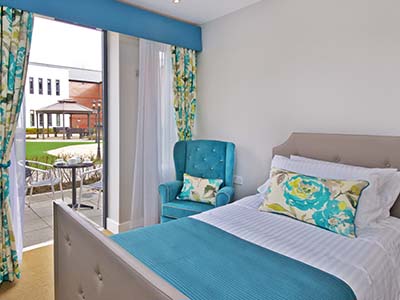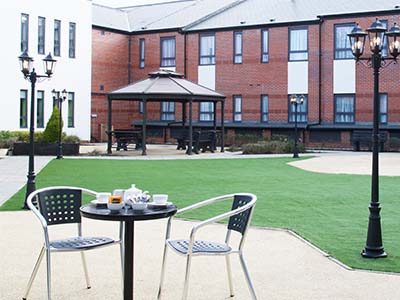How Much Do Care Homes Cost?

In the UK, the demand for care homes is on the rise and so is the cost of care. Care home and nursing home fees in England, Wales and Scotland are among the highest in the whole of Europe, which means many people seeking a care home setting are struggling to find a suitable option.
Within this blog, we look into the average costs of care home and nursing home fees across the UK and we will explore what is included in these fees and what financial support is available.
Care Costs in the UK
One factor that will cause the increase in care costs will be the location of the home. On average, residential care homes in London or the Southern region of England will tend to have higher fees compared to homes located in the Northern parts of the UK.
It is important to remember that each care home and nursing home is different and will provide residents with different kinds of services and facilities. When looking into care homes and nursing homes, it is a good idea to compare each care home in your preferred area to help you determine what home is best for you.

Care Homes & Care Fee Structures
Care homes across the UK will structure their fees completely differently, making it difficult for care seekers and their family members to work out how much care homes actually cost.
Most care homes will charge their fees weekly and others will allow residents to pay on a pay-as-you-go structure for the cost of care. There may be additional charges for things such as treatments, excursions and social activities provided within the home. Some care homes offer an all-inclusive way of living, which usually costs more than a traditional care home as everything is included in the fee you pay.
Residential Care Costs
Residential care fees typically cover your accommodation, all meals and the care you receive, while any use of facilities, additional services and activities are charged accordingly. Residential care tends to be the most affordable care option due to the lower level of care that's provided.
Nursing Care Costs
Nursing care has a more hands-on approach due to the amount of medical care and support needed, which means the cost will be higher compared to a residential care home. The costs of nursing care can vary depending on the specific home and its location, but normally the costs encompass accommodation, meals, medical assistance and personal care. Due to the heightened level of comprehensive support required at a nursing home, nursing care costs are notably higher.
Respite Care Fees
Respite care is a service designed to offer temporary support to individuals requiring care assistance, such as those recuperating from an illness or surgery. This service can also provide caregivers with a well-earned break from their responsibilities of caring.
Fees for respite care can vary based on factors like the duration of the stay and the extent of required care. Typically, respite care facilities have charges on a daily or weekly basis.
What is Included in Care Home Fees?
Care home costs include accommodation, meals, personal care and medical care if required. Nonetheless, it's essential to check with the particular care home what precisely is included in their fees. Certain care homes have all-inclusive options that cover all aspects of life within a care home, whereas others might extend services at an extra expense, such as social activities, hairdressing and transportation.
All-Inclusive Care Home Fees
Within the UK, all-inclusive care homes are witnessing a surge in popularity due to their comprehensive approach. These care homes provide a set fee covering an array of services and amenities, encompassing accommodation, meals, personal and medical care, as well as social activities. While the costs associated with all-inclusive care homes are generally more expensive compared to most care facilities, they do come with distinct advantages. These include providing care seekers and their families a greater idea of what the care expenses will be and helping them avoid any unwanted or concealed fees.
Additionally, with the cost of living crisis that is happening in the UK, all-inclusive care homes can provide a home away from home without the concerns of utility or energy bills as everything is included. Even if you are only considering an all-inclusive home, it is still important to double-check.
Paying For Care Costs
The responsibility for covering the cost of care typically falls upon the person in need of care or their family, depending on their financial situation. However, if the individual lacks the financial means to cover their care expenses, they might qualify for financial support from their local authority to help supplement the remaining costs. All of this depends on the financial situation of the individual and if they meet the criteria.

Getting Help with Care Costs Through Financial Support Services
If someone needs assistance with paying for care, their local authority can help them with their care expenses. A means test has to be carried out, which assesses an individual's income and assets. If this financial assessment concludes that they fall under a certain threshold, it might mean that they are eligible for this form of funding.
However, in some situations, a means test will conclude that an individual's assets and income are above the threshold for financial help. If this is the case, the local authority might offer a deferred payment agreement. Under this arrangement, the local council pays for the cost of your care or an individual's care with a loan which has to be paid back after assets have been sold.
Another option to consider is applying for NHS Continuing Healthcare (CHC) funding. This option is accessible to individuals with substantial healthcare requirements and obtaining such funding entails an evaluation by a team of healthcare professionals.
Local Authority Funding to Pay for Care Costs
Local council funding for care homes and nursing homes provided by their local authority supports individuals financially. This assistance is subject to means-testing, which entails an evaluation of the individual's assets and income.
If an individual meets the criteria for funding set by the local authority, the council will cover the expenses associated with their care fees or partly. However, the amount of funding covered by the local authority depends on the individual's circumstances and can differ across various local councils.
Funding from the local authority can cover the cost of fundamental care home services, including accommodation, meals, and personal care. However, not all care homes and nursing homes accept local council funding and only exclusively have privately paying residents. It is important to ask if local authority funding is accepted when making your initial enquiry with a care home.
Another important thing to note is that local council funding might not fully cover the care costs and a top-up fee may be required, which means the individual requiring care or their families have to cover the remaining costs if the care home fees exceed their personal budget.
Local authority funding may not cover additional services like social activities or excursions. Should an individual require these services, they may need to make separate payments or explore care homes that integrate them into their fee structure like an all-inclusive care home.
NHS Continuing Healthcare
NHS funding for care homes is commonly referred to as NHS Continuing Healthcare Funding (NHS CHC). NHS-funded care provides an array of care and support services provided by the NHS, intended for individuals with significant healthcare needs.
NHS Continuing Healthcare can encompass the expenses associated with nursing home and care home fees, alongside other healthcare-related expenses. Unlike local authority funded, NHS CHC eligibility is based on an assessment of someone's healthcare needs.
To qualify for NHS-funded nursing care, an individual should have complex and ongoing healthcare requirements, which might include severe disabilities, long-term health conditions, or terminal illnesses. An evaluation is conducted by a healthcare professional, such as a registered nurse or doctor to conclude if the individual can qualify for NHS continuing healthcare.
Should an individual meet the criteria for NHS-funded nursing care, the NHS undertakes the full cost of their care fees, which includes accommodation, meals, personal care, and nursing care. Also, it can cover additional healthcare-related expenditures, such as medical equipment and medications.
Being a Self-funder
Self-funding your care home fees is when the care seeker or their loved ones pay for care costs fully themselves without seeking financial assistance from their local authority or NHS.
This entails taking full responsibility for financing their care, which includes personal care expenses such as accommodation, meals, housekeeping and any additional services or facilities furnished by the care home or nursing home.
This approach is commonly chosen by individuals who have savings and assets that can be used to cover their care expenses. It can also be a suitable route for those who don't fulfill the eligibility requirements for funding from the local authority or the NHS.
Being a self-funder is a massive financial commitment and really needs to be well planned out to ensure that you can cover all covers until it is no longer needed. It will always be advised to speak to a financial advisor before moving into a care home to ensure your finances are in order.



Our All-Inclusive Care Home in Sale
Our care home is located in Sale, Manchester and here, we offer an all-inclusive way of life for our residents, where the expenses related to your care are fully covered. This includes not only the provision of care itself but also services, lodging, delectable meals and a diverse range of engaging activities that our dedicated team works hard to curate.
We provide our local community of Sale with comprehensive Residential Care, Nursing Care, Dementia Care, Respite Care and Palliative Care. To provide the best comprehensive assistance, we work alongside many professional caregivers at Amberley Care Home.
At our care home, we have an array of in-house amenities, such as our Cinema and a relaxing beauty salon. Our pride lies in creating an environment that radiates warmth and provides our residents with a home away from home, which offers our residents a haven of comfort. A weekly schedule brimming with activities further enriches their lives, enabling them to indulge in their passions or explore new interests.
At Amberley Care Home, our mission revolves around supporting our residents unconditionally. Through a continuum of care, we ensure that their needs are met, adapting to any changes that may arise over time.
More about Amberley Care Home in Manchester
To find out more about our Care Home, speak to one of our dedicated team members today by calling 01618258222, emailing info@amberleycarehome.com or filling out our contact form. Our team will be more than happy to help and answer any questions you may have.





